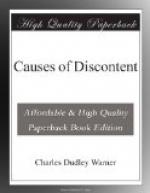And yet men were never so discontented, nor did they ever find so many ways of expressing their discontent. In view of the general amelioration of the conditions of life this seems unreasonable and illogical, but it may seem less so when we reflect that human nature is unchanged, and that which has to be satisfied in this world is the mind. And there are some exceptions to this general material prosperity, in its result to the working classes. Manufacturing England is an exception. There is nothing so pitiful, so hopeless in the record of man, not in the Middle Ages, not in rural France just before the Revolution, as the physical and mental condition of the operators in the great manufacturing cities and in the vast reeking slums of London. The political economists have made England the world’s great workshop, on the theory that wealth is the greatest good in life, and that with the golden streams flowing into England from a tributary world, wages would rise, food be cheap, employment constant. The horrible result to humanity is one of the exceptions to the general uplift of the race, not paralleled as yet by anything in this country, but to be taken note of as a possible outcome of any material civilization, and fit to set us thinking whether we have not got on a wrong track. Mr. Froude, fresh from a sight of the misery of industrial England, and borne straight on toward Australia over a vast ocean, through calm and storm, by a great steamer,—horses of fire yoked to a sea-chariot,—exclaims: “What, after all, have these wonderful achievements done to elevate human nature? Human nature remains as it was. Science grows, but morality is stationary, and art is vulgarized. Not here lie the ‘things necessary to salvation,’ not the things which can give to human life grace, or beauty, or dignity.”
In the United States, with its open opportunities, abundant land, where the condition of the laboring class is better actually and in possibility than it ever was in history, and where there is little poverty except that which is inevitably the accompaniment of human weakness and crime, the prevailing discontent seems groundless. But of course an agitation so widespread, so much in earnest, so capable of evoking sacrifice, even to the verge of starvation and the risk of life, must have some reason in human nature. Even an illusion—and men are as ready to die for an illusion as for a reality—cannot exist without a cause.




